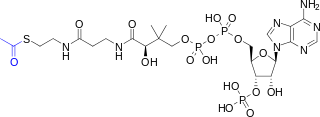Acetyl-coA
 |
|
| Names | |
|---|---|
|
IUPAC name
S-[2-[3-[[(2R)-4-[[[(2R,3S,4R,5R)-5-(6-aminopurin-9-yl)-4-hydroxy-3-phosphonooxyoxolan-2-yl]methoxy-hydroxyphosphoryl]oxy-hydroxyphosphoryl]oxy-2-hydroxy-3,3-dimethylbutanoyl]amino]propanoylamino]ethyl] ethanethioate
|
|
| Identifiers | |
|
72-89-9 |
|
| 3D model (Jmol) |
Interactive image Interactive image |
| ChEBI |
CHEBI:15351 |
| ChemSpider |
392413 |
| ECHA InfoCard | 100.000.719 |
| 3038 | |
| KEGG |
C00024 |
| MeSH | Acetyl+Coenzyme+A |
| PubChem | 444493 |
|
|
|
|
| Properties | |
| C23H38N7O17P3S | |
| Molar mass | 809.57 g·mol−1 |
|
Except where otherwise noted, data are given for materials in their standard state (at 25 °C [77 °F], 100 kPa).
|
|
|
|
|
| Infobox references | |
Acetyl coenzyme A or acetyl-CoA is a molecule that participates in many biochemical reactions in protein, carbohydrate and lipid metabolism. Its main function is to deliver the acetyl group to the citric acid cycle (Krebs cycle) to be oxidized for energy production. Coenzyme A (CoASH or CoA) consists of a β-mercaptoethylamine group linked to the vitamin pantothenic acid through an amide linkage. The acetyl group (indicated in blue in the structural diagram on the right) of acetyl-CoA is linked to the sulfhydryl substituent of the β-mercaptoethylamine group. This thioester linkage is a "high energy" bond, which is particularly reactive. Hydrolysis of the thioester bond is exergonic (−31.5 kJ/mol).
CoA is acetylated during breakdown of carbohydrates through glycolysis, as well as by the β-oxidation of fatty acids. It then enters the citric acid cycle, where the acetyl group is further oxidized to carbon dioxide and water, with the energy thus released captured in the form of 11 ATP and one GTP per acetyl group.
Acetyl-CoA is produced during cellular respiration during the Swanson conversion which takes place in the . After the Swanson conversion the acetyl-CoA is moved into the Krebs cycle.
Konrad Bloch and Feodor Lynen were awarded the 1964 Nobel Prize in Physiology and Medicine for their discoveries linking acetyl-CoA and fatty acid metabolism. Fritz Lipmann won the Nobel Prize in 1953 for his discovery of the cofactor coenzyme A.
...
Wikipedia
